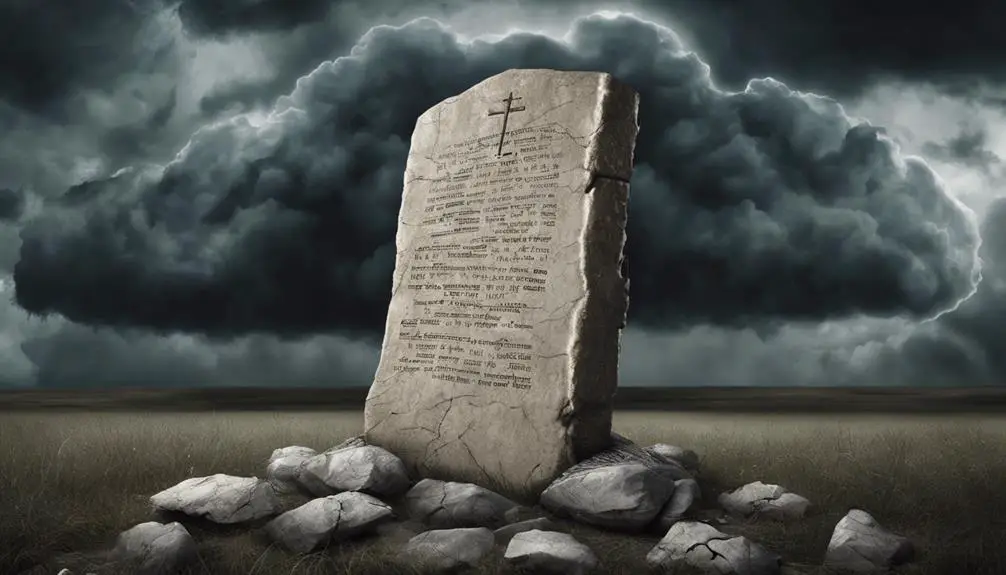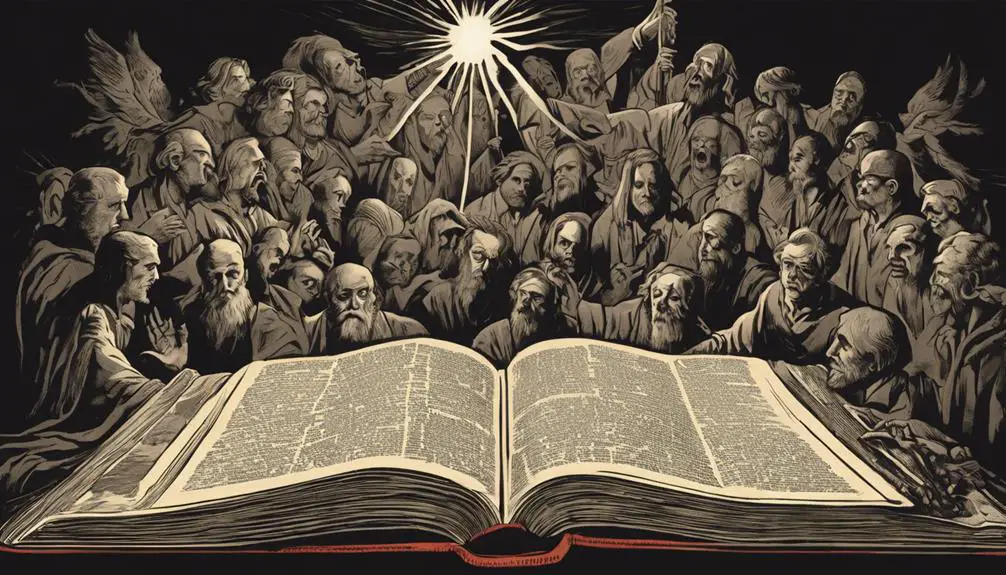Navigate the lesser-known vices depicted in the Bible and discover how they impact your understanding of morality and everyday life.

Vice in the Bible
Just as Dante illustrated the seven deadly sins in his 'Inferno,' the Bible too paints a vivid picture of vice in its many forms.
You may be familiar with the more notorious transgressions, but have you considered the lesser-known vices and their implications?
Imagine uncovering biblical insights on greed, envy, or sloth that you've overlooked before.
What could these revelations mean for your understanding of morality, or even your day-to-day life?
Let's explore this intriguing aspect of biblical teachings together.
Key Takeaways
- The Bible introduces the concept of vice early on, emphasizing self-awareness and transformation as tools to combat them.
- The Seven Deadly Sins, originating from early Christian monasticism, provide a structured understanding of vices.
- Lesser-known vices such as envy and strife are explored in Biblical parables and lesser-examined books, warning about their consequences.
- Overcoming vice in the Bible involves self-discipline, confession, repentance, and the cultivation of traits outlined in Galatians 5:22-23.
Understanding Vice: Biblical Definitions

To truly grasp the concept of vice in a biblical context, it's essential to delve into scripture, analyzing the various terms and scenarios that define immoral behavior. In the 'Vice Origins: Genesis Analysis', you'll find the concept of vice introduced with the fall of man. When Adam and Eve disobeyed God's command, it wasn't just about eating a forbidden fruit; it was the birth of vice: disobedience, pride, and deceit.
The Old Testament, however, isn't the only scripture that tackles vice. In 'Paul's Warnings: Corinthians Examination', you'll see that Paul, in his letters to the Corinthians, warns them about numerous vices. These include idolatry, sexual immorality, thievery, greed, drunkenness, and reviling. Paul writes these not merely as a list of don'ts, but as a call to self-awareness and transformation.
The Seven Deadly Sins Explored

While the Old Testament and Paul's letters provide a foundational understanding of vice, you'll gain deeper insights by exploring the concept of the Seven Deadly Sins, an influential Christian doctrine that categorizes cardinal vices. This theological construct, though not explicitly laid out in scripture, offers a framework to understand human sinful temptations and the vices that can ensnare the human heart.
The Sins' origins can be traced back to early Christian monasticism, particularly the works of Evagrius Ponticus and Pope Gregory I. These early thinkers distilled the list to seven core vices:
- Pride: Viewing oneself as superior to others.
- Envy: Coveting what another has.
- Wrath: Uncontrolled feelings of anger and hatred.
Each sin represents not just an act, but a state of the heart, revealing the deep-seated attitudes and inclinations that drive our actions. By recognizing these sinful temptations, one can begin the vital process of self-examination and repentance. Thus, the Seven Deadly Sins serve as a moral compass, illuminating the path away from vice and toward virtue.
Lesser-Known Vices in Biblical Texts

Beyond the well-trod path of the Seven Deadly Sins, a wealth of lesser-known vices tucked within biblical texts beckons for exploration, inviting you to deepen your understanding of moral transgressions as seen through a biblical lens. You'll find vice symbolism in parables, a narrative tool used to convey moral or spiritual lessons. For instance, the Parable of the Unjust Steward in Luke 16 subtly warns against dishonesty and self-serving manipulations.
Additionally, biblical vice transformations provide intriguing insight. Consider the transformation of Jacob, who starts as a deceiver, but evolves into a virtuous figure after wrestling with God's angel. This transformation signifies the potential for vice to be overcome and redemption to be attained.
You'll also stumble upon vices like envy and strife in the lesser-examined books. The book of James, for example, declares that 'where envy and strife are, there's confusion and every evil work' (James 3:16).
Exploring these underrepresented vices in biblical texts not only broadens your biblical knowledge, but also encourages introspection and moral improvement. It's important to remember that the Bible's intention is to instruct, and these lesser-known vices are part of that comprehensive education.
Consequences of Vice: Lessons From Scripture

Diving deeper into the scriptures, you'll find that they present a vivid picture of the repercussions of vice, demonstrating time and time again the stark consequences of moral transgressions. The Bible unfolds narratives of individuals who, due to their vices, faced Divine Punishment, only to embark on a Repentance Journey that realigned them with righteousness.
Some biblical lessons on the consequences of vice include:
- *Adam and Eve's Disobedience*: Their desire for knowledge led to the Original Sin, resulting in their expulsion from Eden.
- *David's Lust*: His lust for Bathsheba led to adultery, murder, and ultimately the death of their child.
- *Judas' Greed*: His avarice led him to betray Jesus, leading to remorse and suicide.
These narratives aren't merely historical accounts, but serve to underscore the severity of Divine Punishment for vice. They also highlight the transformative power of the Repentance Journey, revealing that even when one has strayed, there's always a path back to righteousness. These stories serve as timeless moral compasses, reminding you of the dire consequences of vice, as well as the redeeming power of repentance.
Overcoming Vice: Guidance From the Bible

In your quest to overcome vice, the Bible offers invaluable guidance, providing practical steps and spiritual principles that foster moral strength and personal growth. Various 'Vice Transformation Stories' serve as real-life examples of individuals who've successfully navigated the path to virtue, often with the aid of 'Divine Intervention Examples'.
Consider the story of Paul, once a vehement persecutor of Christians, who encountered a divine intervention that transformed him into a beacon of Christian faith. Paul's transformation underscores the Bible's assertion that change is possible, even for the hardest of hearts.
Moreover, the Bible emphasizes the need for self-discipline and self-control to combat vice. Galatians 5:22-23 explicitly lists these traits as fruits of the Spirit, suggesting their divine importance in the process of overcoming vice.
Additionally, the Bible encourages confession and repentance. The act of admitting to vice, as depicted in 1 John 1:9, opens the door to forgiveness and cleansing, crucial steps in the vice transformation journey.
Frequently Asked Questions
How Does the Concept of Vice in the Bible Compare to Other Religious Texts?"
When comparing religious texts, you'll find differing interpretations of vice. Your comparative analysis should consider each scriptural context.
While some tenets may overlap, unique cultural and historical factors shape each religion's views on morality. It's crucial to appreciate these nuances, seeking to understand rather than judge.
You'll find that vice, like virtue, is a complex, multifaceted concept across different religious doctrines.
How Has the Interpretation of Vices Changed Through Different Eras and Cultures?"
You've noticed how cultural influence can alter vice perception. In different eras, society's understanding of vice symbolism has shifted, reflecting evolving norms and values.
For instance, what was considered a vice in the Biblical era mightn't be viewed the same way today. These changes aren't just time-bound but are also influenced by regional and cultural diversities, causing interpretations of vices to vary greatly across different societies and epochs.
What Role Did Vice Play in the Lives of Prominent Biblical Figures?"
In examining prominent biblical figures, you'll find vice playing a pivotal role. Often, it's through their vices that characters experience profound transformation, a concept known as 'Vice's Redemption'.
Additionally, vice can be linked to prophecy, shaping destinies. You'll notice that even those considered righteous aren't immune to vice, proving it's a universal human struggle.
This examination unveils the complexity of these characters and the overarching theme of redemption in their narratives.
Are There Any Contradictions in the Bible About What Constitutes a Vice?"
You're asking if there exist any inconsistencies in the classification of vice in the Bible. It's complex, as interpretations can vary.
Some see contradictions, arguing that certain actions are labelled as vices in some books, but not in others. Alternatively, others maintain a consistent theme of vices throughout.
It's crucial to understand the cultural and historical contexts of these texts when analyzing such inconsistencies.
What Are Some Modern Day Vices That Aren't Explicitly Mentioned in the Bible?"
You're probing modern-day vices that aren't explicitly mentioned in the Bible. Considering 'Vice vs Virtue' and 'Biblical Vice Interpretation', you'll find many.
Internet addiction, for instance, is a prevalent vice today that couldn't be addressed in the Bible. Similarly, excessive consumerism, although not expressly labeled a vice in biblical text, contradicts the virtues of simplicity and contentment.
It's essential to apply biblical principles to understand these contemporary moral challenges.
Conclusion
In conclusion, you've navigated the complex terrain of vice in the Bible. From the notorious seven deadly sins to lesser-known vices, these transgressions and their consequences have been illuminated.
But remember, the Bible also offers guidance to overcome vice. Through understanding, self-reflection, and spiritual discipline, you can steer clear of these pitfalls. It's a challenging journey, but one that brings you closer to a virtuous life, as ordained by Scripture.



Sign up